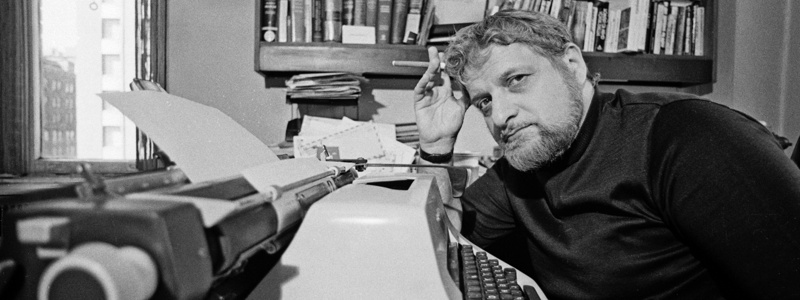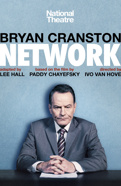
(Photo: Getty Images)
Lee Hall on Crafting a Stage Adaptation of Network While Honoring Paddy Chayefsky's Cinematic Original

When Network, a film about a fictional television network struggling with low ratings, was released in November 1976, it was deemed a grim satire. The movie went on to win four Academy Awards, including one for Best Screenplay for author Paddy Chayefsky. Chayefsky’s prescience about the corruption of the media by corporate greed and sensationalism has gained respect over time as his vision became reality. Deemed one of the 10 greatest screenplays of all time by the Writers Guild of America, Network was adapted for the stage by Tony-winning Billy Elliot scribe Lee Hall. A hit in London in 2017, the drama now plays Broadway’s Belasco Theatre with Bryan Cranston in the central role of troubled anchorman Howard Beale. On the latest episode of the new Broadway.com show Front Row, Managing Editor Beth Stevens talks to Hall and Dave Itzkoff, who wrote a book about the making of Network, to find out more about Chayefsky's visionary work.

The Bronx-born Chayefsky, who died in 1981, wrote novels and plays and was perhaps the best-known scribe of the Golden Age of Television, and he is the only person to win three solo Academy Awards for Best Screenplay.(He also won for Marty and The Hospital.) Deeply revered as a writer’s writer—dramatists such as Neil Simon, Aaron Sorkin and Kenneth Lonergan have all publicly admired him—his scripts are known for their emotional and thematic depth and furious, unsparing speeches (exemplified in Network). He once said of his work (as quoted in his New York Times obituary): "Characters caught in the decline of their society—that's the essence of almost everything that I write.''

(Photo by Caitlin McNaney for Broadway.com)
Hall, who was taken with Network when he first saw it in the 1990s, tried to get the rights to a stage adaptation over a decade ago. It didn't happen then, but he was given another shot with the current production: "[Network's] really brilliantly simple," he says, "but it manages to draw in so many things about news, about corporations, about capitalism, and really about how it affects us in our personal lives. I always just thought it would be a fantastic thing to try and do on stage."
Dave Itzkoff, a culture reporter for The New York Times, was inspired to write a book about Chayefsky and the making of Network called Mad as Hell: The Making of Network and the Fateful Vision of the Angriest Man in Movies. He became interested in the subject after being invited to view the Chayefsky archives, which are owned by the New York Public Library for the Performing Arts. "It was just really fascinating," Itzkoff says about seeing the accumulated drafts, handwritten notes and research at the library. "It was a real window, not only into Chayefsky's writing process, but who he was as a person at that time and what he was thinking about. The better you understand him, I think, the more you can learn about the film.”

(Photo by Emilio Madrid-Kuser for Broadway.com)
Itzkoff is not surprised that Network was adapted for the stage. With its big message, ideas and speeches, there is something almost Shakespearean about the film. "There are these many famous diatribes," Itzkoff says, "just pages and pages of not being interrupted. It's unusual to see in a movie, but that is much more how you're used to seeing characters express themselves on stage. So, in that way alone—this is not to diminish what Lee Hall and [director] Ivo van Hove have done—[it is] tailor-made to be a play.”
The ideas in the movie are also ripe for today's audiences. "This was a movie that was for years celebrated because of how it anticipated what really did happen in the TV industry," Itzkoff says, "but, I think, especially now, we understand that Network is also a story about anger. What happens when people are given license to just unleash their anger when they're given a massive platform to be angry and to channel the anger of their viewers?”
Of course, the most famous speech in Network is the one in which unhinged news anchorman Howard Beale yells on live television, "I'm mad as hell and I'm not going to take this anymore!" Hall calls the anger displayed in the script "a trap." He continues. "It's a way of losing control, rather than this feeling that you get that you're in control if you get angry. I think the play is really exploring that: the traps that are laid for us. That the very thing that causes the indignities and the anger manages to control and manipulate that very anger for its own ends. I think that's certainly one theme of the play."
Hall, who also perused the Chayefsky archives, agrees the more one learns about the writer, the more one gets out of Network. "I think he's one of the great American dramatists of the last century," he says. "I see him in the same sort of pantheon as Tennessee Williams. I think that his writing is so robust and so thoughtful, and especially in this—it's an incredible act of clairvoyance. I really wanted to honor Paddy's work because I just think it's extraordinary."
